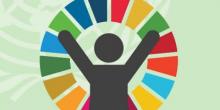Making a difference in the "most corrupt country" in Europe
Languages: English - Pусский


To reform laws is to reform societies. At IDLO, this is something that we have had thirty years to learn. And there are no more important laws than fundamental laws – national Constitutions. One of greatest, the Constitution of the United States of America, has served that nation well for nearly a quarter of a millennium. Constitutions encapsulate a vision. In countries struggling to overcome trauma, as is the case of Kenya; struggling to be reborn, as in Somalia; or struggling to be born at all, as in South Sudan, Constitutions respond to a collective need for unity and renewal.
But Constitutions are also highly technical documents. They set the parameters for law and justice in a given jurisdiction. For this reason, they require legal resources and expertise unavailable in many developing nations. By providing those resources and expertise, IDLO is proud to have assisted several countries through complex constitutional processes.
Languages: English - Pусский

Gender equality, justice, good governance and the rule of law dominated discussions the Director-General of IDLO, Irene Khan, held with officials during a recent visit to Canada.

PRESS RELEASE: (Mopti, Mali)- December, 7, 2016 – The International Development Law Organization (IDLO) held a meeting today to launch its program in Mali, aimed at strengthening the criminal justice chain in the north of the country. The program is being implemented in four regions of Northern Mali: Gao, Mopti, Segou, and Timbuktu.
The last two decades following the Beijing Platform of Action have seen a proliferation of laws that address gender equality in intersecting areas of women’s political and economic participation, violence against women, equal pay for equal work, family relations, reproductive rights, land and property rights, and access to services.

“Men and boys have to be there with us,” advocated IDLO’s Director-General, Irene Khan, during an event looking at ‘Fighting the backlash against women’, organized by the Overseas Development Institute to mark International Women’s Day.

“How do we know when the rule of law works? What do we mean by justice?” opened IDLO’s Director of Research and Learning, Ilaria Bottigliero, at the expert roundtable, Critical Reflections on the 2nd Generation of Rule of Law Reform. “For IDLO, it’s when women have better access to justice in Afghanistan. It’s when citizens in Uganda have access to the medicine they need.
Renforcement de la chaine pénale au nord du Mali. En 2016, l’IDLO a lancé un programme de cinq ans au Mali, financé par le Gouvernement des Pays-Bas : « Renforcement de la chaîne pénale au nord du Mali ».
On November 7th and 8th in Manila, IDLO launched its new program in the Philippines with signing ceremonies at the Office of the Ombudsman and the Department of Justice. The ceremonies officially marked the opening of two initial projects in the country.
On a recent trip to a Central Asian preliminary detention center, the custodians proudly showed us the new ventilation system to prevent from spread of TB – a cut-in window directly across the door.




